Wholesale Food
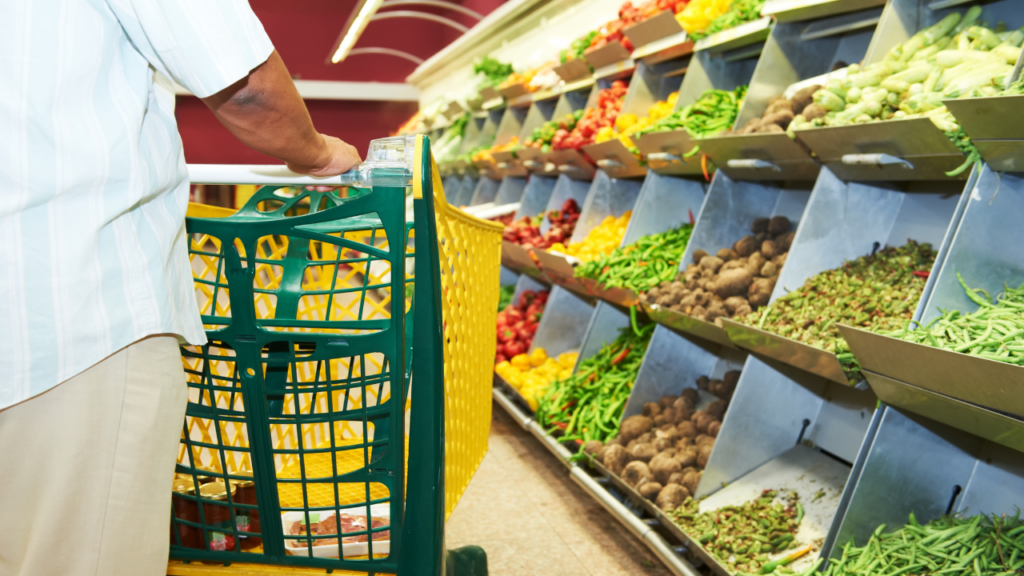
Food Wholesalers and Their Role in the Food Industry
Food wholesalers are large companies that supply retailers, restaurants and other businesses in bulk with food items. They may specialize in certain categories or offer a range of foods.
Finding the ideal food distributors can make all of the difference for your business, whether it be commercial kitchen supplies, bakery ingredients or delivery services. Here are some tips that will help you locate a suitable wholesale provider.
What is a food distributor?
Food manufacturing and beverage supply chains can be complex environments to navigate for anyone new to them, with all sorts of jargon and terms that can be confusing for newcomers. Understanding food distributors’ roles within both ends of supply chains is essential in creating lasting business partnerships and keeping costs under control while upholding quality.
Food distributors are companies responsible for distributing food items (like cups, plates and napkins) to food service operators such as restaurants, cafeterias or industrial catering businesses. They typically operate within specific geographical areas, while providing services like warehousing and inventory management as additional offerings to their clients.
Food distributors buy wholesale products from manufacturers at discounted rates, which allow them to resell them to retailers at higher retail prices and earn revenue and profits in turn.
Food manufacturers sometimes employ multiple distributors to market and promote their products. This approach allows the manufacturer to cover more ground and attract new customers while the distributor handles orders, payments, marketing initiatives and payments on behalf of the brand. Furthermore, this relationship gives an additional boost when it comes to increasing sales of the food products being promoted by them.
Food distributors come in all forms and each fulfills an essential function within the industry. From broadline distributors that supply shelf-stable goods for foodservice operators to specialists delivering specialty or niche products for restaurants or hospitals. There are even distributors belonging to larger foodservice distribution groups who can help their customers keep consistency across quality of goods supplied.
Brokers act as intermediaries between food manufacturers and retailers, selling products they do not themselves own to retailers at an agreed-upon markup price. Brokers provide more flexibility when selecting which food products to stock; furthermore, they may provide clients with valuable market intelligence not available directly from manufacturers themselves.
How do food distributors work?
Food distributors play an essential role in the food industry supply chain. They connect manufacturers to end users such as restaurants and retail outlets, while also offering marketing services to reach new markets for products. Food distributors may specialize or be broadline, with cash and carry service or delivery service offered as additional features.
Food manufacturers specialize in producing premium food and beverages, but if they lack the resources or expertise to distribute their own products they may enlist the assistance of a wholesale food distributor – especially smaller privately-held producers who may lack access to large distribution networks and channels; larger firms typically already have such relationships in place for themselves; however it may be more cost-efficient for smaller producers to work with a food distributor who specializes in their type of product production.
Broadline food distributors supply an assortment of products to restaurants, grocery stores and other commercial foodservice operations. Their portfolio of brands gives them buying power that enables them to negotiate lower prices from manufacturers before passing those savings onto customers.
Some food service distributors are large enough to run their own warehouses, saving on warehousing costs while giving their customers more flexibility with delivery schedules. Others utilize special warehousing systems like refrigerated sprinters to transport fresh products directly from manufacturers to their customers.
Redistributors provide another service, taking a cut of CPG companies’ margin or buying goods directly from manufacturers before selling them at higher prices to food service distributors. This may help smaller, independent food manufacturers compete with larger broadline or niche food service distributors for purchasing power.
Food distributors that specialize in certain areas, such as kosher or halal foods, work closely with manufacturers to bring these specialized items to market and may also provide marketing support and additional value-add services for their clients.
What are the benefits of working with a food distributor?
Food distributors provide many advantages to both manufacturers and retailers alike. First, they provide more cost-efficient means of transporting goods; they can handle larger volumes at once and thus decrease costs while simultaneously leading to reduced consumer prices. In addition, wholesalers are often able to negotiate better pricing with suppliers and pass these savings onto their customers.
Food distributors also offer various marketing services to assist brands in building awareness of their brand, from social media campaigns and traditional ads, allowing smaller brands to reach a broader audience than they otherwise could on their own.
Food distributors can serve as an entryway into larger retail grocery outlets. KeHE and UNFI are known for having strong connections with many different retailers nationwide – this can be invaluable when looking to increase market presence for new products.
Food distributors also play an invaluable role in assuring that products meet quality standards before being sold, from proper storage and handling procedures, sourcing only fresh ingredients, to meeting consumer expectations with finished products that surpass them. A good wholesale food distributor will help their clients reach these goals and achieve long-term customer satisfaction.
Selecting an ideal food wholesaler for your business is key. Find one who can meet all of your needs – from delivery timeframes and pricing structures – seamlessly. Seek out a supplier that offers a broad selection of products, is reliable, and can adapt to meet the evolving needs of your business. A trustworthy partner will allow you to focus on expanding and growing your profits while knowing your supplies are safe in capable hands. Jordanos is an award-winning wholesale food supplier that can assist with all of your needs. Speak to them now about their products and services; they promise you high-quality goods at competitive rates while making sure all orders arrive on time.
Where can I find a food distributor?
Food distributors sell wholesale products to businesses such as restaurants, bars, schools, hotels and convenience stores. Their offerings typically include foods, beverages and kitchen supplies like utensils, napkins and cups; depending on the nature of each business they may also provide equipment or other specialty items. Some distributors have large cash and carry warehouses where customers can pick up orders themselves; others use delivery trucks that make delivery straight to customer doorsteps.
One of the best ways to locate a food distributor is through word-of-mouth recommendations from other business owners or by attending industry trade shows and networking events. You could also search online for “food distributors” or “food supplier companies”. A reliable food distributor should have an established track record of providing quality products on time while being well-connected within its local market.
If you are new to restaurant ownership, networking with other restaurant owners and seeking referrals of food distributors is recommended to find one who fits your specific needs and ensures you have someone on your team who understands the unique challenges associated with running one.
Alternately, you could also directly approach distributors by writing or emailing them and outlining your business and product offerings. If they think your product would fit well with their customer base, they might consider working together.
Direct purchases from manufacturers are another option, though this often requires a higher minimum order quantity (MOQ). Wholesale food distributors may have warehouses where they store the products they sell to their customers – saving you from renting or purchasing storage space at your own cost. Plus, using one ensures that any unsold inventory can quickly be cleared out so you’ll always have what you need in stock!
Step-by-step training on how to sell to retail chains!
We explain exactly how to do that and how to get started today. I’ve taught over 100,000 of companies over the years across the globe on how to get your products to the stores. And so we’re here to support you. Or please subscribe to our Youtube channel and or be on the lookout for additional training that we create.
We are here to expedite the process of generating revenue with your physical products and that’s what we’re all about. Take a look at our advanced training, live events, certification programs and so much more.
In this training, I will discuss some of the things to think about when approaching a retailer to sell your products and become a vendor. Hope it helps! 🙂
Karen Waksman,
Retail MBA
Questions? Contact Us!
1-855-Retail-2 (Call or Text)
Email: info@retailmba.com
Retail MBA provides a step-by-step formula on How to Sell to Major Retailers, Online Retailers, Smaller Retailers, Catalogs and More. No Experience Required! These solutions continue to convert for clients year-over-year! These are Time-Tested and Proven Strategies that we utilize ourselves when going after stores! Everything we teach, we test. Want access to these formulas? ANY one of our programs and coaching systems gives you access to them now. With that said…
Here are 5 Easy Ways to Work with Us:
1) Free Training – If You Would Like to Join Our Next FREE Webinar Training Called “Retail Chain Store Secrets – How to Sell to Major Retail Chains. No Experience Required” Then Sign Up NOW To Learn All About Selling into Retail Chains By Clicking Here!
2) Retail MBA Year Long Coaching and Training System – Our Year Long Coaching and Training System with Karen Waksman is POWERFUL! This is our most popular training and coaching system! We walk you through how to approach, pitch and sell to retail chains and we coach you along the way! Join us by Clicking Here!
3) Masterclass Intensives – Want to Join our Next 4 Week Elite Retail MBA Masterclass Intensive? These Intensives Are EPIC for people who Love Fast Paced Learning – Homework, Retail Coaching, Developing Your Strategy, Buyers Contacts and More! These Events Are Held Every Quarter. Join us by Clicking Here!
4) Done-for-You Program – If You Want Karen Waksman and Her Team to Reach Out to Your Top Dream Retail Chains On Your Behalf – And You Have a Retail-Ready Product, Check Out our Epic Done-For-You Service by Clicking Here!
5) In Person Events – If You Want to Learn LIVE and Meet Karen Waksman in Person at Our Next “America’s Next Retail Product: LIVE Event with Other Like-Minded Individuals in Beautiful San Diego, CA! We Would LOVE to Have You Join Us by Clicking Here!
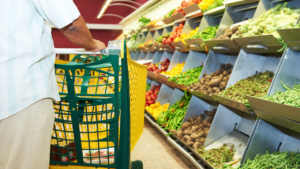
Check Out Our Additional Blog Posts Here:
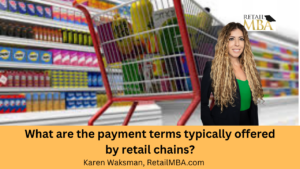
Retail Terms
Retail Terms – What are the payment terms typically offered by retail chains? Click Here to Learn More!
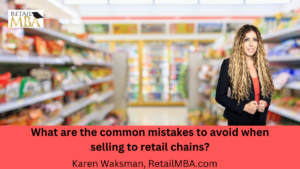
Retail Vendor
Retail Vendor – What are the common mistakes to avoid when selling to retail chains? Click Here to Learn More!
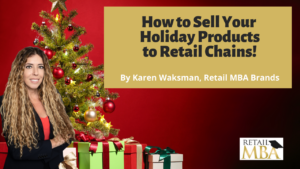
How to Sell Your Holiday Products to Retail Chains
New Training on How to Sell Your Holiday Products to Retail Chains

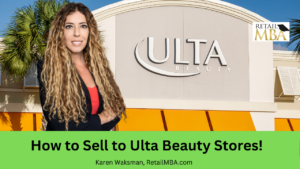
Ulta Beauty Vendor
Ulta Beauty Vendor – How to Sell to Ulta Beauty Stores. Click Here to Learn More!
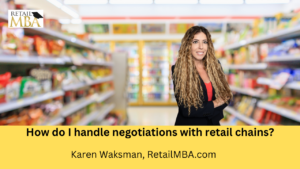
Retail Strategy
Retail Strategy – How do I handle negotiations with retail chains? Click Here to Learn More!

